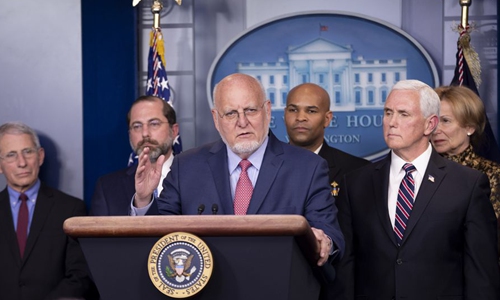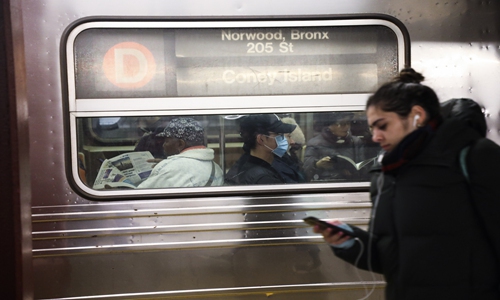HOME >> CHINA
Time for US to learn from China to deal with the COVID-19 outbreak
By Chen Qingqing and Liu Caiyu Source:Global Times Published: 2020/3/17 0:28:40

Director of the US Centers for Disease Control and Prevention (CDC) Robert Redfield attends a press conference on the COVID-19 at the White House in Washington DC March 9, 2020. Photo:Xinhua
As the COVID-19 epidemic situation worsens in the US with the number of cases rising sharply, US scientists expressed frustration over the US government's choice to ignore the Wuhan experiences in which the Chinese city had run a costly experiment.
Chinese and US experts suggested it is time for the US to learn from the good part of Wuhan playbook but not to totally replicate the Chinese city's model in fighting the virus.
The total confirmed coronavirus cases in the US reached 3,774 as of Monday, with a death toll of 69, according to data compiled by Johns Hopkins University.
Renee C Wurth, an American population health scientist, who suggested in an earlier article in the Guardian that it's time to follow the good part of the Wuhan playbook because it worked, told the Global Times on Monday that Wuhan is the only place that lost control of the virus to a significant degree and then was able to reign it back. And she was afraid that the US is unlikely to achieve that.
"There is no consistency or uniformity to our plan. The president talks only about washing hands, while some states have banned going to restaurants, bars, which will result in chaos and confusion. Few people understand what is happening here, let alone what happened in China," she said.
"As a scientist that is frustrating. It feels like Wuhan ran a costly experiment and we have chosen to ignore the results," she said.
Wang Hongwei, a professor at Renmin University of China's school of public administration and policy, told the Global Times that the US has enough resources and advanced technologies to handle the COVID-19, and the emergency response mechanism is also mature, but the overconfidence and lack of knowledge on the virus make them react slowly, and this is why the US didn't successfully prevent the outbreak.
What the US can learn from us is limited as the two countries have very different political systems, but some experiences are totally valuable for the US to copy, such as implementing a strict quarantine policy, and converting museums and sports stadiums into makeshift hospitals to quarantine and treat the increasing number of patients and suspected cases, Wang said.
Some American experts forecast the actual infection numbers in the US might have reached 50,000 to 500,000. Chen Xi, an assistant professor of public health at Yale University, predicted that there will be one week of window opportunity for the US to contain the virus spread.
Medical experts warned that most Americans have to adapt to a "new normal," as life will be different amid the pandemic. New York authorities announced the shutting down of the city's school system, the nation's largest, media reported, until at least April 20 due to pandemic concerns.
Anthony Fauci, the top infectious disease doctor who advises the White House, told CNN on Sunday that it won't rule out supporting a temporary nationwide shutdown to combat the virus. Americans needs to realize that life will begin to look much different "as the country tries to slow the spread of the disease."
Trump declared a national emergency, which means it will activate a nationwide mobilization. But because the federal government failed to adopt effective measures to contain the spread of the virus in the early stages, the pandemic is spreading in the US, analysts noted.

A passenger at a New York City subway train wears a face mask. Photo: Xinhua
The decisive measures made by the Chinese central government have been well implemented on the local government level, which is one of the reasons for the effective battle against the coronavirus in China. Likewise, the US federal government and states should avoid divergence and strengthen their coordination, Li Haidong, a professor at the Institute of International Relations of the China Foreign Affairs University, told the Global Times on Monday.
But how the states coordinate with the federal government on resource distribution and how states effectively work with each other remains an issue. US states which have already taken their own measures, cannot catch up with the pace of the federal government, which has been underplaying the epidemic, Li said.
The US cannot simply copy China to manage communities by using a "community grid management system," but the US has a large number of NGOs and churches able to play a similar role of mobilizing people in communities, Liu Weidong, a research fellow at the Chinese Academy of Social Sciences' Institute of American Studies, told the Global Times.
NGOs and churches could actively find and handle issues for residents, even make door-to-door visits to help raise the awareness of Americans and advocate self-protective measures, Liu noted.
The community grid management system in China plays a crucial role in helping the country fight the novel coronavirus epidemic, under which populous urbanized areas are divided into various blocks and communities.
Facing the expanding epidemic in the country, the US, a country which owns cutting-edge technology, will soup up to conduct the coronavirus-related scientific research and test in full gear, Liu said, which is one of the advantages that the US possesses in the fight against the virus.
Wurth also noted that China's experiences and heavy price paid at the early stages of containing the virus have not been fully understood in the US, as policymakers make decisions based on confirmed cases, even though everyone knows there's a lack of testing.
People are not asked to work from home because some companies think such a measure may reduce productivity, and companies are not being told by government what to do - so this is why they make choices that are aligned with their economics interest, she noted.
Newspaper headline: Time for US to learn from Wuhan to deal with the COVID-19 outbreak